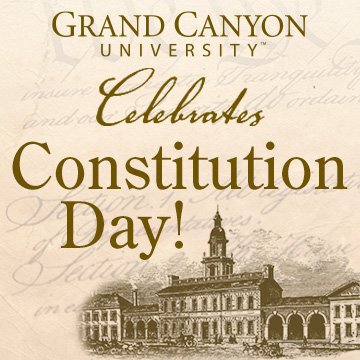
By Laurie Merrill
GCU News Bureau
Which Article of the U.S. Constitution describes the Judicial Branch of the government?
Which of the two houses of Congress is historically known as the upper house?
How many changes have been made to the Constitution?
The answers are Article Three, the Senate and 27, in that order, but if you had a hard time answering, you’re not alone.
With the recent emphasis on science, technology, engineering and math in K-12 schools across the country, civics classes have increasingly become second-class citizens, said Dr. Sherman Elliott, Dean of the College of Humanities and Social Services.

“It begs the question – how do you have a functioning democracy if your citizens are not educated in democracy?” Elliott said.
That’s why Monday’s celebration of Constitution Day and Citizenship Day at Grand Canyon University is so important, Elliott said.
“Constitution Day gives us the opportunity to focus on the principles and ideals of our Constitution in every setting,” Elliott said. “The best way to learn civics is to do civics.”
The actual commemoration is Sept. 17, which marks the 230th anniversary of the signing of the supreme law of the land.
GCU observed the holiday on Friday as well as today, and scheduled a celebration from 11 a.m-1 p.m. Monday on the Promenade. Students, faculty and staff were encouraged to don their favorite red, white and blue clothing.
Lessons in the Constitution are being incorporated into classes across the curriculum, Elliott said.
Among suggested discussion topics:
- A “psychological” bill of rights, including questions such as these:
- How does it feel when your rights are violated? How would it feel to be denied the right to worship the god you believe in or forced to worship a god you don’t believe in?
- Can freedom of speech be expensive? How do you explain the bombardment of negative political ads?
- How far is too far before detention becomes unduly intrusive?
- How well can students answer one of the many Constitution quizzes or puzzles circulating in the media today? If you were to create a community poll, what would be your question?
“In science, there could be a discussion on patents and who owns intellectual property,” Elliott said. “Or pose the question -- is health care a fundamental right?”
Professors also can ask students to explore pending legislation on the national or local level, follow a bill and consider its ramifications, Elliott said.
“Every faculty will do something on the Constitution today,” Elliott said. “It is a crucial topic.”
Contact Laurie Merrill at (602) 639-6511 or [email protected].



































































